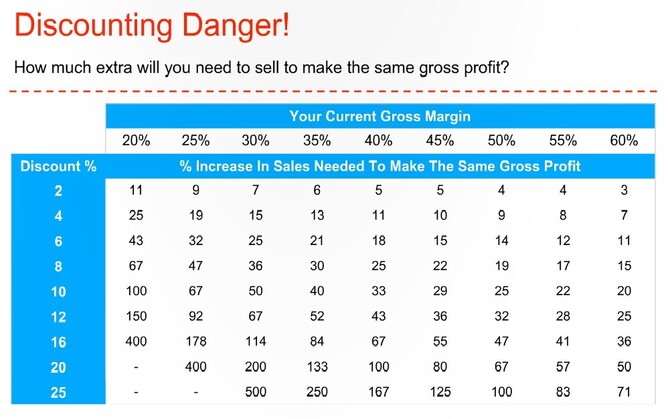Offering a discount in the heat of negotiations may seem like a good idea at the time but thoughtless discounting is an easy way to lose money fast.
Before you succumb to the temptation to win new business by offering a discount take a moment to consider these ten problems associated with discounting.
1. Discounting eats away profit margins!
2. Negotiating a discount focuses the customer’s attention on your price. If your only competitive advantage is price you are in trouble because price can always be matched by a competitor. The focus should be on the benefits of the product to the customer that make the price, if not irrelevant, then at least not the primary influencer of the decision to buy.
3. Discounting can affect the customer’s perception of the value of your product – the ‘you get what you pay for’ syndrome. The less they pay, quite likely the less they will value it.
4. Discounting may affect the quality of your service. If you have offered a discount and realise your profit margin is going to be slim if you do the job to your usual standard then there’s the temptation to cut corners. That compromises the quality of your work and if it results in customer complaints it eats into your margins even further. Poor work gets talked about and you risk your reputation and the referred business that can come out of being known for quality.
5. Discounting can result in reduced demand. Customers might see the opportunity to buy at a discount as an opportunity to really stock up on the item and that can decrease their need to buy for some time into the future. Altered buying patterns can effect sales predictions and cash flow forecasts.
6. Discounting increases work hours. In effect, discounting means lower income per hour, so to maintain your profit level you are going to need to put in extra hours to compensate for the narrower margins on your sales.
7. Customers can gouge you. Word of discount deals gets spread around and if you did it for one customer what is your justification for refusing it to the next one who tells you they ‘know you did it for Person X’?
8. Discounting can be addictive. To make a sale it’s easy to fall into the habit of offering a discount as a first resort instead of as the last. It’s possible to win custom by offering to negotiate on things like after sales service, a longer guarantee period or an added accessory rather than resort to a discount offer. Some of these may never turn into an extra cost to you but are valuable to the customer and may be preferable to a discount in their eyes. Before you discount, stop and think: is this the only way I can give value?
9. Guessing wrong. If you make up your discount offers on the spur-of-the-moment you are going to guess wrong. It’s very easy to underestimate costs and end up out of pocket. Discounts, if offered at all, need to be based on an itemised costing of the job and include a buffer for any extras incurred should things not go as smoothly as expected.
10. Discounting starts price wars. The company that usually wins is the one with the biggest balance sheet—the one who can afford to hold out the longest. That’s a dangerous game to play.
Unfortunately, discounting as a business practice has become so entrenched because of its supposed ability to win sales that it is difficult to break the habit. But think about how many times offering a discount has actually been an investment that paid off in the long run.
Of course, there are some valid business reasons to discount, such as liquidating obsolete or seasonal stock or to meet cash flow requirements. But smaller businesses should have carefully calculated strategies for discounting so it’s not done thoughtlessly with a disregard for margins or retaliatory action by irate competitors. If you want to follow best practice then develop a price policy that includes your discount deals and the exact amounts to be offered in each circumstance and stick to it. Base it on an understanding of the real costs of production and your profit margins. If you employ salespeople, make sure they know about it and stick to it as well.

